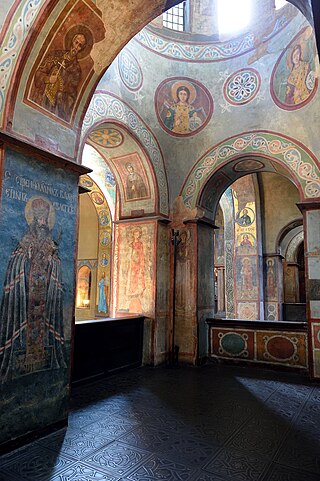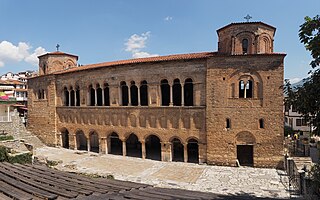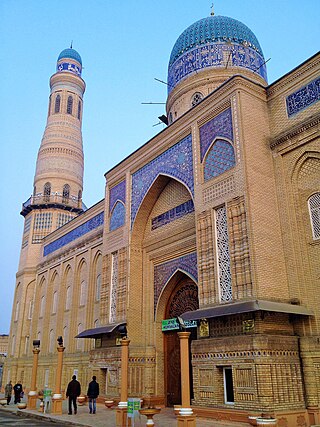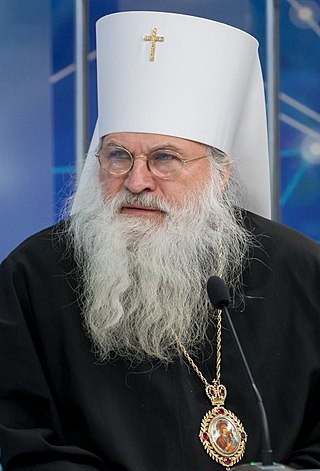
The Eastern Orthodox Church, officially the Orthodox Catholic Church, and also called the Greek Orthodox Church or simply the Orthodox Church, is the second-largest Christian church, with approximately 230 million baptised members. It operates as a communion of autocephalous churches, each governed by its bishops via local synods. The church has no central doctrinal or governmental authority analogous to the head of the Catholic Church. Nevertheless, the Ecumenical Patriarch of Constantinople is recognised by them as primus inter pares, a title formerly given to the patriarch of Rome. As one of the oldest surviving religious institutions in the world, the Eastern Orthodox Church has played an especially prominent role in the history and culture of Eastern and Southeastern Europe.

The Russian Orthodox Church, alternatively legally known as the Moscow Patriarchate, is an autocephalous Eastern Orthodox Christian church. It has 194 dioceses inside Russia. The primate of the ROC is the Patriarch of Moscow and all Rus'.

Eastern Christianity comprises Christian traditions and church families that originally developed during classical and late antiquity in the Eastern Mediterranean region or locations further east, south or north. The term does not describe a single communion or religious denomination. Eastern Christianity is a category distinguished from Western Christianity, which is composed of those Christian traditions and churches that originally developed further west.

Samarkand or Samarqand is a city in southeastern Uzbekistan and among the oldest continuously inhabited cities in Central Asia. Samarqand is the capital of Samarqand Region and a district-level city, that includes the urban-type settlements Kimyogarlar, Farhod and Khishrav. With 551,700 inhabitants (2021), it is the third-largest city of Uzbekistan. 60% of the population of Samarkand speak Samarqandi as their first mother tongue, which is a dialect of Persian.
Greek Orthodox Church is a term that can refer to any one of three classes of Christian churches, each associated in some way with Greek Christianity, Levantine Arabic-speaking Christians or more broadly the rite used in the Eastern Roman Empire.

The Far Eastern Federal District is the largest of the eight federal districts of Russia, but the least populated, with a population of around 8 million according to the 2021 Census. The federal district lies entirely within the easternmost part of Asia and is coextensive with the Russian Far East.

The Chinese Orthodox Church is an autonomous Eastern Orthodox Christian church in China. An organized Orthodox presence was maintained in the region as early as the 17th century as a child of the Russian Orthodox Church, which granted the Chinese Church autonomy in 1957 amidst its ongoing suppression in the Soviet Union.

Hilarion is a bishop of the Russian Orthodox Church and the suspended metropolitan of Budapest and Hungary. He is also a noted theologian, church historian and composer and has published books on dogmatic theology, patristics and church history as well as numerous compositions for choir and orchestra.

Christianity in Azerbaijan is a minority religion. Christians who estimated between 280,000 and 450,000 (3.1%–4.8%) are mostly Russian and Georgian Orthodox. There is also a small Protestant Christian community which mostly came from Muslim backgrounds. Due to the very hostile relations between Azerbaijan and Armenia, Armenian Christians have practically entirely fled the country, and so the Christians in Azerbaijan are members of various other groups, mostly Russians.

Christianity is the predominant religion in Ukraine, with 85% of the population identifying as Christian according to a 2022 survey conducted by the Kyiv International Institute of Sociology (KIIS). Seventy-two percent of the population avowed fidelity to an Eastern Orthodox Church: 54% of Ukrainians proclaimed adherence to the autocephalous Orthodox Church of Ukraine; 14% identified as Orthodox Christian without specifying a church affiliation; 4% associated with the Moscow Patriarchate. Another 9% of Ukrainians professed devotion to the Catholic Church in Ukraine: 8% Ukrainian Greek Catholics and 1% Latin Catholics. Two percent of the population declared affiliation to a mainstream Protestant Church, and a further 2% identified with some alternative sect of Christianity.

Christianity in Uzbekistan is a minority religion.
The Turkmen of Turkmenistan, are predominantly Muslims. According the U.S. Department of State's International Religious Freedom Report for 2022,
According to U.S. government estimates, the country is 93 percent Muslim, 6.4 percent Eastern Orthodox, and 0.6 percent other. There are small communities of Jehovah's Witnesses, Shia Muslims, Baha’is, Roman Catholics, the International Society for Krishna Consciousness, and evangelical Christians, including Baptists and Pentecostals. Most ethnic Russians and Armenians identify as Orthodox Christian and generally are members of the Russian Orthodox Church or Armenian Apostolic Church. Some ethnic Russians and Armenians are also members of smaller Protestant groups. There are small pockets of Shia Muslims, consisting largely of ethnic Iranians, Azeris, and Kurds, some located in Ashgabat, with others along the border with Iran and in the western city of Turkmenbashy.

Christians, most of whom are ethnic Russians, constitute less than 11% of the population in Turkmenistan; Eastern Orthodoxy in Turkmenistan is the main form of Christianity.

In North Macedonia, the most common religion is Eastern Orthodox Christianity, practiced mainly by ethnic Macedonians, Serbians, Vlachs, and Romanis. The vast majority of the Eastern Orthodox in the country belong to the Macedonian Orthodox Church, which declared autocephaly from the Serbian Orthodox Church in 1967.

Christianity has a long history in Kyrgyzstan, with the earliest archaeological remains of churches belonging to the Church of the East in modern-day Suyab dating back to the 7th century. By the 9th century an archdiocese of the Church of the East cared for the Christians of Kyrgyzstan and adjacent areas in eastern Turkestan. Although primarily Turkic there was also an Armenian community in what today is Kyrgyzstan by the 14th century. By the 15th century, however, there were no longer ecclesiastical structures of any church caring for what is today Kyrgyzstan and Islam gained the ascendancy amongst the Kyrgyz people.

Islam is the predominant religion in Uzbekistan.

The Russian Orthodox Church in Uzbekistan is the main community of Eastern Orthodox Christianity in Uzbekistan, a predominantly Muslim country. Many of its members are Russians. Uzbekistan falls within Tashkent and the Central Asian Eparchy of the Russian Orthodox Church. The Eparchy is headed by a Metropolitan. Since 2011, the current Metropolitan of Tashkent and Central Asia is Vincent (Morar).
Based on the numbers of adherents, the Eastern Orthodox Church is the second largest Christian communion in the world, after the Roman Catholic Church, with the most common estimates of baptised members being approximately 220 million. The numerous Protestant groups in the world, if taken all together, substantially outnumber the Eastern Orthodox, but they differ theologically and do not form a single communion.

Oriental Orthodoxy in Uzbekistan refers to adherents of Oriental Orthodox Christianity in Uzbekistan. Since Uzbekistan has a predominant Muslim majority, Oriental Orthodox Christians and adherents of other Christian denominations in that country constitute a religious minority.

Vincent, is a bishop of the Russian Orthodox Church. He serves as Metropolitan of Tashkent and Uzbekistan and he is a permanent member of the Holy Synod of the Russian Orthodox Church.
















